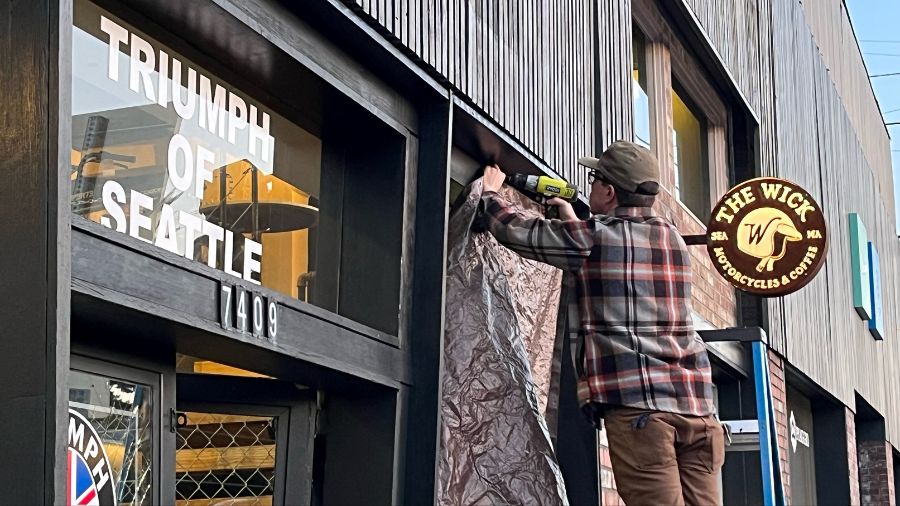Seattle bikeshare history 101
Jul 10, 2018, 5:14 PM | Updated: Dec 29, 2019, 8:13 am

Seattle experiments with bikeshare parking stalls in Ballard. (SDOT)
(SDOT)
Seattle’s experience with bikeshares has been mixed. The first attempt failed, but recent Seattle bikeshare experiments have proven popular. That led to thousands of bikes available to rent on Seattle streets, and bikeshare companies have expanded into neighboring cities. Soon, though, Lime will be ending its own bikeshare offering entirely, leaving the future of the service very much up in the air.
2014-2017: Pronto Cycle Share aka Pronto!
Seattle’s first attempt at a bikeshare system was the Pronto Cycle Share — Pronto! for short.
- Pronto! launched in October 2014 by a non-profit with city help.
- It was station-based, meaning that customers picked up and dropped off bikes nearest their destinations. Helmets were dispensed at the stations for customer use.
- The bikeshare was more expensive than others around the country — $8 for 24-hour use, $16 for three days, or an annual membership for $85.
- Pronto had about 500 stations throughout downtown, Capitol Hill, and parts of the U-District.
- It was primarily used by tourists in the downtown core, and Capitol Hill residents looking for a quick downhill ride to work.
Pronto’s gears grind to halt
From the start, Pronto! failed many expectations. The system launched in October 2014, amid one of the rainiest seasons the city experienced in recent years — not an attractive time to ride a bike.
- Pronto! expected to see 446,000 trips in its first year — it sold 142,846.
- Total revenue over its first year was projected to be $860,000 — it only made $613,000.
Without city council knowledge, the Seattle Department of Transportation floated Pronto! $305,000 in late 2015 to keep it running. The city ultimately ended up buying the bikeshare in March 2016 for $1.4 million, not knowing SDOT was already spending money to keep the bikeshare afloat.
In January 2017, Seattle decided to dump Pronto! It shut down in April 2017. Seattle considered replacing it with a $5 million, all-electric system. The city opted not to move forward.
2017-current: Stationless in Seattle
It didn’t take long after Pronto! folded for private companies to descend upon Seattle. The City of Seattle started a pilot program to test new stationless bikeshares for one year, starting in July 2017. Three companies rolled into town as part of the pilot — SPIN, Limebike, and ofo.
RELATED: Three days commuting to work via stationless bikeshare
The stationless systems were different than the failed Pronto! The bikes were able to be picked up from just about anywhere. Customers use an app to scan a bike to unlock it. They lock it at their destination and the ride is over. Rides cost roughly $1 for 30 minutes, plus a few cents for every 30 minutes after that.
While the three companies were very similar, they did have a few differences.
- SPIN: A three-gear orange bike. SPIN promoted that it tunes its bikes differently than elsewhere to accommodate for the area’s hills.
- ofo: An eight-gear, bright yellow bike.
- Limebike: The company offered two options — An eight gear bike or an electric model called the “Lime-e.” It later transitioned fully to electric-assist bikes.
Another bikeshare, JUMP, which has ties with rideshare company Uber, began courting city officials in early 2018, before arriving in November of that year.
Initial results for stationless bikes
SDOT reported bikeshare usage statistics through late summer and fall of 2017:
- Around 120,000 trips taken between July and September 2017.
- By the end of November 2017, Seattleites had taken a total of 347,300 rides.
- That means in the roughly three cold, rainy months, 227,300 trips were taken on bikes from one of the three companies.
- It also means that in six months, the private companies provided more trips in Seattle than Pronto! did in its 2.5 years.
- After 11 months, customers took 1 million trips on Limebike alone.
It wasn’t all good news, however. The bikes were common targets for vandalism and pranks.
Parking
The Seattle bikeshare pilot required stationless bikes be parked in the “furniture zone” of the sidewalk or at a bike rack. The furniture zone is an area where benches, bike racks, or trees are normally placed along the sidewalk.
While many may like the stationless model, messy parking has been among the top complaints in Seattle. Ballard has experimented with bike boxes to encourage proper parking. SDOT even made an instructional video.
In 2019, improperly parked bikes became an epidemic, with the city taking punitive action against both Lime and JUMP. SDOT has since reported improvements in that department.
New gigs
The three companies didn’t just bring bikes to Seattle, they brought jobs. In particular, two SDOT employees switched gears and left to work at bikeshares.
Kyle Rowe was the go-to SDOT employee for Seattle bikeshare programs and was involved with the stationless pilot. He left to go work at SPIN just five months into the city’s stationless pilot program. His position at SPIN is geared toward public sector relations. He was barred from working with Seattle for two years, however.
SDOT director Scott Kubly jumped from Seattle to Limebike to serve as the company’s chief programs officer at its San Mateo, Calif. headquarters. Kubly briefly worked at Motivate, a bikeshare operator with ties to Pronto! He failed to note this on a conflict of interest form when he first came to work for the city. He was found to have violated the city’s ethics code for neglecting to note the conflict, and working on bikeshare projects. Kubly was fined $5,000 for the infraction.
Kubly was soon prohibited from working with the city in his position at SPIN.
Disappearing bikeshares
The presence of both ofo and SPIN in Seattle was short-lived, with both companies leaving the city in August 2018 (just two months before Uber introduced JUMP). The next to leave will be Lime, who will be removing all of its dockless bikes from Seattle streets by Dec. 31.
The company’s permit expires at the end of the year and it has already started reducing its fleet for the winter months. Just last month, Lime said it would end its pilot program in Bellevue.
Lime hopes to reintroduce a mix of both e-scooters and bikes by spring 2020. That being so, Seattle has been slow to adopt electric scooters.
In late 2019, Seattle started putting into place rules for electric scootershares. Documents show that the city will cap scooter speed limits to 15 miles per hour. Other planned restrictions on scooters include a proposed measure keeping them off of sidewalks, and limiting them to bike lanes and “multi-use trails.” There will also be limitations on where they can be parked.
Meanwhile Everett, Tacoma, Bothell, and Redmond have all already welcomed e-scooters to their cities.
Beyond Seattle bikeshare
If a bikeshare ride was dropped off outside city limits, it would lock up and an employee would have to return it to Seattle. But Limebike, for example, expanded its system in Bothell, just north of Seattle.
The City of Bellevue developed its own pilot based on the stationless Seattle bikeshare program. It only allows electric bikes, however. Redmond formed its own, too. Kirkland also crafted permits for bikeshares.













